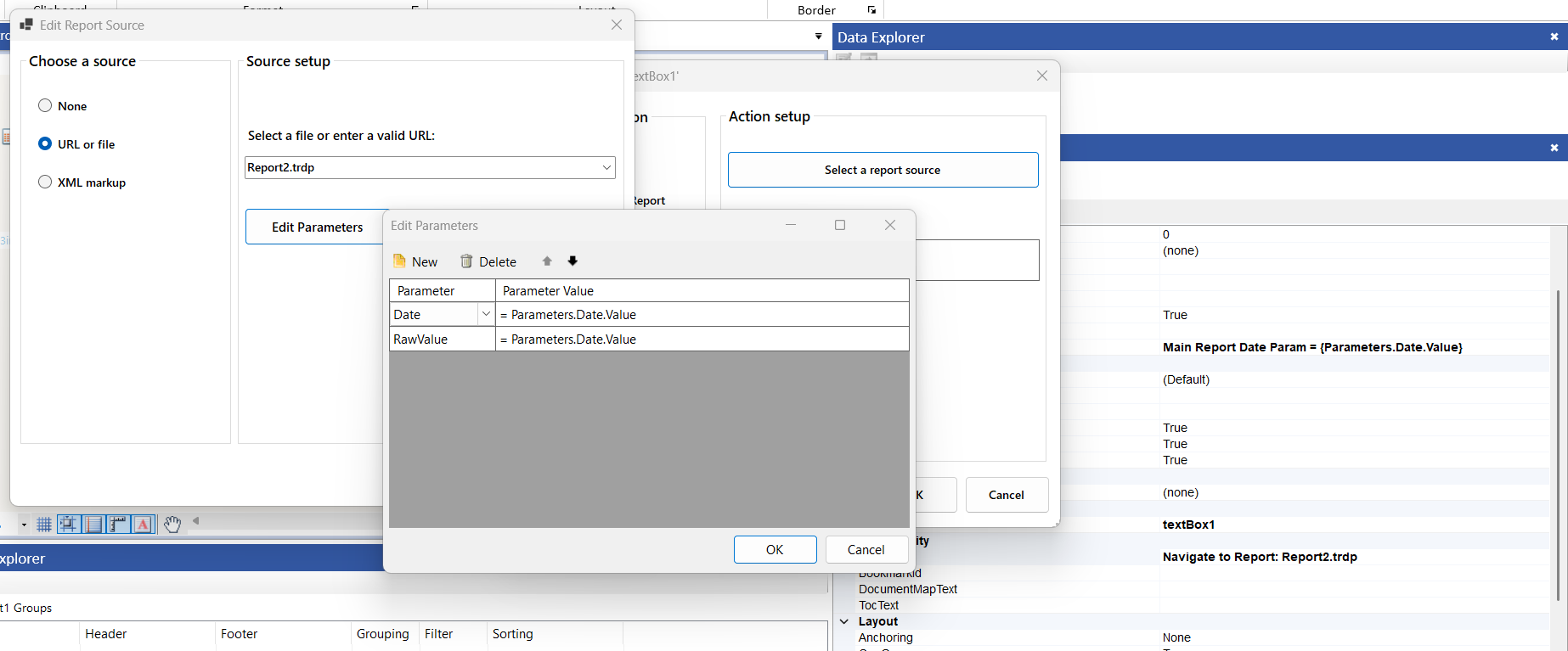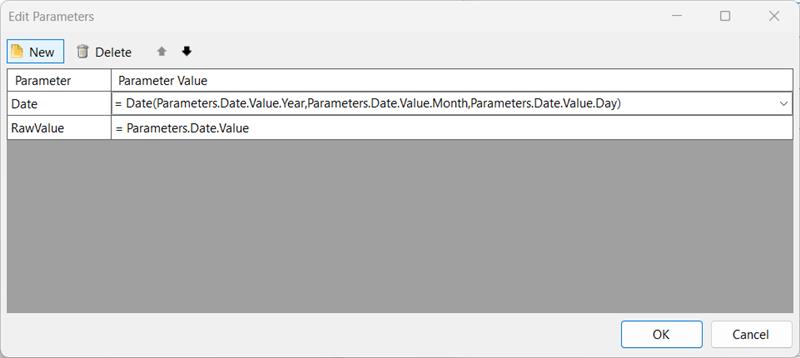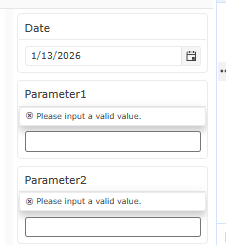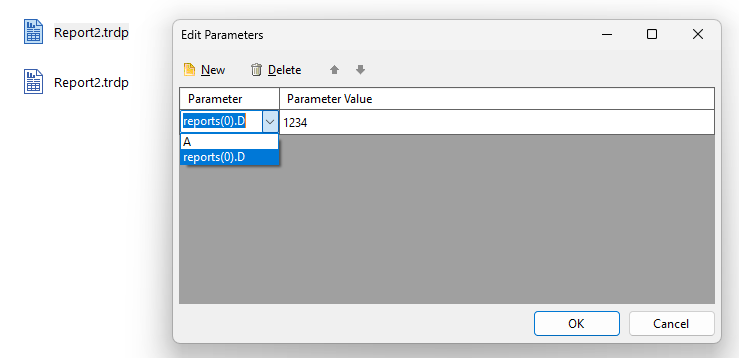After updating to the Q1 2026 release of Reporting, I get the following error when passing the value of a DateTime parameter from the main report to a DateTime parameter of a report that I open via the Navigate To Report action:
CSharp.Net10.ReportingRestServiceCorsDemo Error: 0 : Parameter /Date(1771253073461)/ does not match Epoch regex format! CSharp.Net10.ReportingRestServiceCorsDemo Error: 0 : Parameter /Date(1771253073461)/ does not match Epoch regex format!
The issue seems to occur only when directly passing the value of the DateTime report parameter, so as a workaround, I decided to create a new date using the Date() function. For example:
When using a report parameter of type string whose value resembles a date format (e.g., "3036-01"), the System.Text.Json serialization logic used by Telerik Reporting incorrectly treats the value as a date instead of a plain string. As a result, the parameter is serialized and displayed as a parsed DateTime value rather than the original text, leading to unexpected outputs such as "3036-01-01T00:00:00.0000000":
The provided URI should instead be only the relative URI that I have set on the action.
I have an image set to the checkbox through the CheckedImage property. When I export the report to Excel using the Skia graphics engine, the image is not present at all, or cut off.
The same issue is not present in the GDI engine or with the PictureBox item.
I have projects on .NET Core and I want to use the System.Text.Json serializer that is the new default, but reporting relies on Newtonsoft.Json.
---
ADMIN EDIT
There are two approaches that can be taken right now to solve this:
OPTION 1: define separate endpoints (services, projects) for the different tasks - they can still use the same database layer through a shared project, depending on the architecture you have. This would let you have separated services with the appropriate serializers without custom attributes and code (see below). For example, create a separate project for the reporting REST services.
OPTION 2: add some custom decoration on the endpoints so you can choose which serializer is used on each, you can find some examples here: https://stackoverflow.com/questions/59650907/how-to-configure-two-json-serializers-and-select-the-correct-one-based-on-the-ro - the point being to register a serializer depending on the endpoint based on your own code rather than let the framework put one in for all endpoints.
NOTE: This would be a breaking change.
---
I have created an ellipse shape item and have set its Stretch property to True. Then, I have set the width of the item to be 1.5in, while the height is 1in, which results in a horizontally stretched ellipse on design-time:
However, when I render the report on Linux where the Skia graphics engine is used, the shape is not rendered properly:
Currently, the GetDesignerResource endpoint of the Web Report Designer service is case-insensitive, which can lead to issues if the URL is made lowercase at some point, such as by a URL rewrite rule, or similar scenarios.
For example, the following reference to the Web Report Designer script will load return the file:
<script src="api/reportdesigner/designerresources/js/webReportDesigner"></script>But if lowercase is used, for example, like this:
<script src="api/reportdesigner/designerresources/js/webreportdesigner"></script>The request will return a 404(Not Found) response.
I'm using VS 2022, the demo reporting (Telerik_Reporting_2026_Q1_20_0_26_211). When using the "Telerik Report 2026 Q1 Wizard", I select the following
- "Table Wizard"
- Current Data Sources
- Add New Data Sources
- Select "Object Data Sources
- I select my Assembly and data object.
- I select the Data source Member
See attach file when I finish the wizard.
The HTML5 Report Viewer uses inline templates which may require enabling the unsafe-eval CSP policy.
The viewer should migrate to using CSP templates as shown in Getting Started with Content Security Policy (CSP) Templates - Kendo UI Templates - Kendo UI for jQuery.
I am using the ObjectDataSource component of the Standalone Report Designer. However, I get errors mentioning that types from `System.Private.CoreLib` cannot be loaded. This used to work in version 19.3.26.121. The workaround in the latest version is to manually register the `System.Private.CoreLib` assembly in the designer through `assemblyReferences` (File -> Options -> Add).
We are using "@progress/telerik-angular-native-report-viewer": "29.26.211"
Seems options Fit to page/Fit to width are mixed
Fit to page does what Fit to width should be doing and vice versa
When using A4 paper or narrow-edge leading media the Web Viewer prints everything perfectly.
When using a 60mm x 30mm label, therefore "wide-edge" leading media, the web viewer prints the label in landscape, even though the print is in portrait!
Just because the media is "landscape" surely it is the print on the media that determines the orientation?
When using the Windows System Print Dialogue this does not occur, on the using the print from the Web Viewer. This is because the Web Viewer converts it to PDF first to print (I believe). Surely, in the code you can state NOT to rotate, OR rotate it back to the correct orientation for wide edge leading media.
The label design is portrait so all the "print / pdf" code needs to do is to query this and not assume that wide edge leading media automatically prints in landscape.
Currently, the desktop viewers don't allow adding custom headers to their requests to the service.
In HTML5-based web viewers, this is possible through the AjaxPrefilter event.
Using the text-indent CSS setting results in part of the text on the first line being cut off:
Currently, if the SkipBlankPages property is set to True and there is not any significant content in the report, the following message will be displayed in the designer and the viewer: The current data set presented in the report did not produce any significant content, so no pages were generated. If you need to see the whole report content, including blank pages, please contact the report author.
I use the kendovalidator before rendering the report to check the correct parameter of initial and final date.
However, the validation fails because additional inputs (for the "Send Email" functionality) are included in the HTML output of the viewer even though I have disabled it.
I believe that if the "Send Email" option is disabled the mail data panel should not be created.
However, in my report, the Interactivity options do not show any property for Level. I am only seeing basic properties like Action, BookmarkId, DocumentMapText, TocText, etc.
The Level field is completely missing.
I cannot localize the messages of the Angular and React report viewers using the suggested approaches:
- Angular Report Viewer Localization - Telerik Reporting
- Localizing the React Report Viewer - Telerik Reporting
The only alternative is to use the approach from the Localization of the HTML5 ReportViewer Explained - Telerik Reporting article, which I can do only by loading the string resources script in index.html of the SPA.
Please note the spelling error in the k-notificaiton-error class name. Should be k-notification-error:
<div class="trv-parameter-error k-notification k-notificaiton-error" style="">
<span class="k-notification-status k-icon k-i-x-outline"></span>
<span class="trv-parameter-error-message k-notification-content">Parameter value cannot be empty.</span>
</div>
Because of this, error messages are rendered with incorrect color (should be red):
In the Report Book’s Edit Parameters dialog, non‑mergeable parameters only show index 0 in the dropdown, even when multiple report instances are present:
Other indexes can be applied only by manually typing the value into the combo box, but this behavior is not intuitive and makes it unclear that parameters can be assigned per instance.








